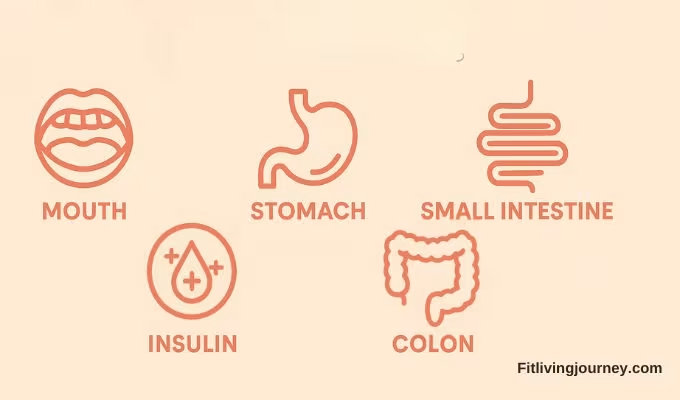Are Carbs Really Bad
Today we’re talking about carbohydrates and how they are digested by our body.
Should we be eating carbs? Are carbs bad? When it comes to weight loss, we’re going to talk all about it.
Carbohydrates: The Primary Energy Source
The source of carbohydrates for our body is energy.
When our body needs energy to make it through the day, the workout, or just getting up in the morning, it’s reaching for carbohydrates — the number one energy source for our body.
Every body is different, so every body digests, uses, and reacts to carbohydrates differently.
Naturally Occurring vs. Processed Carbohydrates
There are naturally occurring carbohydrates and processed carbohydrates.
Naturally occurring carbs come from fruits and vegetables, while processed carbohydrates come from bread, chips, cookies, pastries, cakes, etc.
Knowing the difference is important — and knowing which one we should be utilizing matters.
Three Types of Carbohydrates
- Starches (complex carbs)
2. Sugars (simple carbs)
3. Fiber (found in both)
Complex carbohydrates break down into glucose (blood sugar).
Simple carbs are made of one or two sugar molecules, while complex carbs contain three or more.
Fiber isn’t broken down or digested but supports heart health and weight management.
Natural vs. Processed Sugars
Naturally occurring simple sugars are found in fruit and dairy.
These are very different from processed sugars found in cakes, cookies, and pastries.
Good Sources of Complex Carbohydrates
Examples of complex carbs include whole grains, legumes, beans, lentils, peas, and potatoes.
These are also rich in fiber. Fruits, vegetables, whole grains, beans, and legumes are great fiber sources.
Consuming fruit helps prevent disease and supports weight loss.
Sugar in Fruit vs. Processed Sugar
If a doctor, nutritionist, or weight loss coach tells you to avoid fruit because of sugar, find a new one.
Fruit contains fiber, which prevents blood sugar spikes — unlike processed carbohydrates.
Health Impact of Processed Carbohydrates
Processed carbohydrates, when consumed in excess, can lead to type 2 diabetes and heart disease.
It is nearly impossible to avoid all processed carbohydrates.
Bread, sweet treats, and favorite meals in moderation are normal, acceptable, and sustainable for weight loss.
The Role of Dairy
Dairy provides protein and high-quality carbohydrates. Your daily calorie goal should include 45–65% carbohydrates.
Carbohydrates are not bad. You do not need a very low-carb diet to lose weight.
I eat over 200 grams of carbohydrates every day. I’ve lost 140 pounds and maintained it.
Individual Carbohydrate Needs
Your carbohydrate intake will differ from mine. Everyone has different needs.
Personalized macros and calorie goals are essential.
You should know your daily intake recommendations for carbs, proteins, fats, and your calorie deficit for weight loss.
How Carbohydrates Are Digested
All food is broken down for use by our body. Carbohydrates are used for energy. Digestion begins in the mouth.
Saliva moistens food and releases amylase, breaking down sugars.
The stomach processes food into smaller pieces.
It travels down the esophagus and becomes chyme.
The Journey Through the Digestive System
Stomach acid kills bacteria in the chyme. It then moves to the small intestine (duodenum).
The pancreas releases pancreatic amylase to break it into dextrin and maltose.
The small intestine releases lactase, sucrase, and maltase — breaking sugars into monosaccharides (single sugars).
These are absorbed and stored as glycogen.
Insulin and Energy Use
The hormone insulin is released and uses glycogen as energy.
Any remaining undigested food enters the colon, where it’s broken down by intestinal bacteria.
Fiber, found in many carbs, is not digested. It reaches the colon and is eliminated in stools.
Medical Conditions and Carbohydrate Processing
Certain medical conditions affect how carbohydrates are processed.
If you have any such condition, consult your doctor.
Focus on complex carbohydrates and adjust your daily carb intake so your body can use it for energy — not store it as fat.
Carbohydrates Are Essential
Even with conditions requiring carb restriction or a low-carb diet by choice, carbohydrates remain essential for energy.
Our body thrives on carbohydrates. Do not eliminate them.
Focus on fruits, vegetables, and complex carbohydrates.
FAQs
Are all carbs bad for weight loss?
Ans. No. Naturally occurring carbs from fruits, vegetables, and whole grains support weight loss and health.
What is the difference between simple and complex carbohydrates?
Ans. Simple carbs have 1–2 sugar molecules; complex carbs have 3 or more. Complex carbs provide fiber and sustained energy.
Can fruit cause blood sugar spikes?
Ans. No. Fruit contains fiber, which slows sugar absorption and prevents spikes, unlike processed sweets.
Should I avoid processed carbs completely?
Ans. It’s not realistic to avoid all processed carbs. Occasional treats in moderation are sustainable for weight loss.
How do carbs give us energy?
Ans. Carbohydrates are broken down into glucose, stored as glycogen, and used by the body for physical and mental energy.
8 Simple Ways to Stop Overeating

